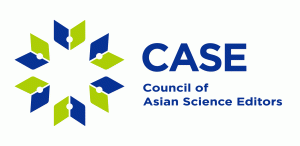CASE2017 Meeting Report
The 4th Asian Science Editors’ Conference and Workshop 2017
Soon Kim
Cactus Communications Korea, Seoul, Korea
The Council of Asian Science Editors (CASE) 2017 International Conference was held on July 6 and 7, 2017 at Nong Lam University in Ho Chi Minh City, Vietnam. The main theme was “Promotion of Asian journals to the international level” and it was organized into 12 sessions held over 2 days.
Most preconference sessions are about the technical aspects of journal publishing. Some sessions have a period for participants to practice based on the speakers’ presentations and get immediate feedback. Overall, the workshop was more practical than I had expected.
On the opening ceremony, Chris Hammond, the publishing director of Elsevier, gave a lecture entitled “Meeting the changing needs of the researcher.” On the second day, it was started with two keynote lectures. One is “Helping publishers get closer to authors: Perspectives from a global survey of academic authors” by Basil D’Souza of Editage. Wim Meester, the head of product management for Scopus of Elsevier, presented the second keynote lecture, entitled “Scopus indexing to bring Asian journals to an international level. As the morning session, 4 lectures on open access—the main theme of the seminar—were given. After lunch, 10 to 15 Asian journal editors gathered to have an individual discussion on each theme. Personally, this was the most memorable session. As I observed how journal editors from each country of Asia, including Japan, Vietnam, and Singapore, gave diverse pieces of advice stemming from their individual experiences to Vietnamese journal editors, it occurred to me that the internationalization of Asian journals lies in the not-too-distant future if these seminars are held in each country of Asia.
https://www.escienceediting.org/journal/view.php?number=112#__sec1titleReport on the 4th Asian Science Editors’ Conference and Workshop
Subramaniam Ramanathan
Singapore National Academy of Science and Nanyang Technological University, Singapore
Science journals in Asia have generally still some way to go before they can reach the rigor and standards of journals published in the Western world. With the proliferation of academic scholarly output in the sciences in many Asian countries over the years, it is clear that not all research can be published in top international journals. Local journals in Asian countries are still needed to provide an avenue for the dissemination of new knowledge in the sciences as well as provide a platform for academics and graduate students to publish some of their work. There is a need for more local journals to embrace international best practices so that they can be indexed in the premier databases as well as achieve impact factors. These will also contribute towards raising standards of submissions to these journals as well as enhancing capacity building efforts in the higher education sector in the sciences. To further this broad mission in Asia, the Council of Asian Science Editors (CASE) was formed in 2014. A key platform for CASE to raise awareness of this mission has been the organizing of its annual Asian Science Editors’ Conference and Workshop.
The 4th Asian Science Editors’ Conference and Workshop was held in Ho Chi Minh City in Vietnam on July 6 and 7, 2017, with the theme on ‘Promotion of Asian journals to international level.’ This year’s event was organized by CASE in collaboration with the Vietnam Association of Science Editing and Nong Lam University. Over 170 participants from various countries attended the 2-day event.
The conference program explored a range of issues pertinent to Asian science journals. With editors of international journals, representatives of international publishers, and staff from renowned editing services featured in the conference and workshop, participants had tremendous opportunities to hear from the experts as well as network with them. Such a confluence of speakers added great value to the event and reinforces the point that raising the standards of journals is a team effort.
The conference also provided a useful platform for researchers and graduate students to share their findings through the medium of posters. A ‘Best Poster Award’ was given to the authors of the poster that communicated its findings most clearly.
Overall, the spectrum of issues covered in this year’s conference provided useful insights and perspectives relevant to the science journal scene in Asia. The coming together of various stakeholders in the system as well as the audiences who came from different countries reinforced the point that science journals in Asia need to take cognizance of multifarious issues as they seek to raise their standards. CASE places on record the great hospitality of Nong Nam University which hosted the conference.
